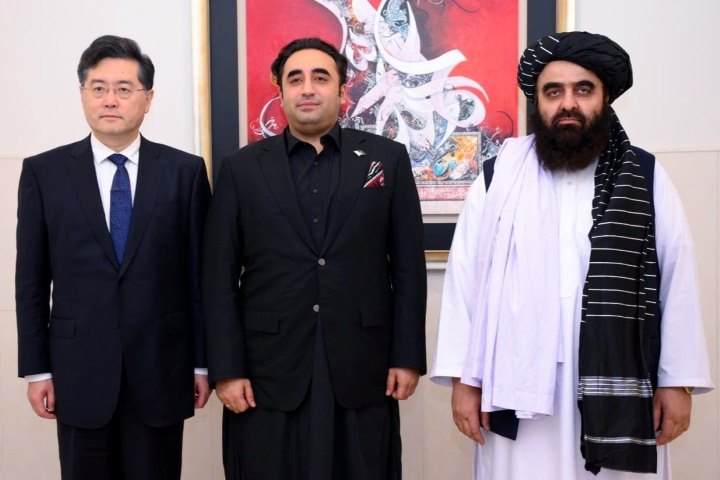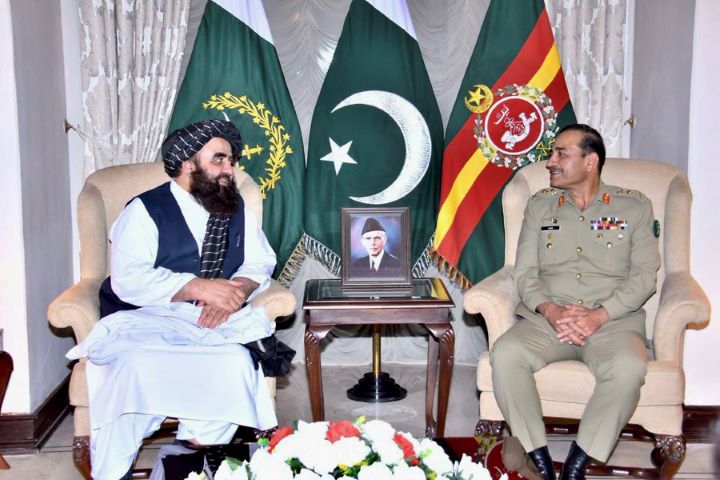

Chinese Foreign Minister Qin Gang and Pakistani Foreign Minister Bilawal Bhutto with Afghanistan’s Acting Foreign Minister Amir Khan Muttaqi (Photo: ForeignOfficePk/Twitter)
A blunt China underlined the bottlenecks of terrorism in Afghanistan and political instability in Pakistan that hold back the China-Pakistan-Afghanistan trilateral group from making progress.
Islamabad had organised the fifth China-Pakistan-Afghanistan Trilateral Foreign Ministers’ Dialogue at its foreign office on Saturday. The three countries discussed political engagement, counter terrorism, trade and connectivity to advance their common agenda for regional cooperation.
Afghanistan’s Acting Foreign Minister Amir Muttaqi, who is under UN sanctions, was given special permission by the UN to leave Afghanistan to attend the trilateral. He separately met Pakistani Army Chief General Asim Munir at the Army House in Rawalpindi.


China laid the roadmap for Pakistan on how to take their relationship forward. Chinese Foreign Minister Qin Gang spoke about the political crisis in the country, the China-Pakistan Economic Corridor (CPEC) and Pakistan’s poor financial health. He also referred to terror groups inside Afghanistan that pose a threat to the security of the region.
Talking about the biggest and most visible sign of their bilateral relationship – the CPEC, Qin Gang said that unless there was internal stability the CPEC projects could not move ahead. He was referring to the poor security for Chinese nationals, institutions and projects across the country. He referred to the targeting of Chinese nationals at the Dasu hydro-power project, the Confucius Institute in Karachi and attacks in other parts of the country.
He made it clear to his Pakistani friends that unless there was internal stability inside Pakistan, CPEC projects could not move ahead. Chinese companies have often stopped work on CPEC’s power and infrastructure projects citing inadequate security.
Qin Gang said: “China sincerely hopes Pakistan political forces can get together and overcome issues of political stability so that they can grow on the economic front together with us”.
Giving a lecture on administrative governance to his Pakistani hosts, the Chinese foreign minister said: “We sincerely believe that the political forces in Pakistan will build consensus, uphold stability and more effectively address domestic and external challenges so that it could focus on growing the economy, improving people’s lives”.
Referring to Pakistan’s precarious economic situation, he said that Beijing will look closely at possible solutions at the financial and foreign exchange pressure on Islamabad and will do its best to help Pakistan in the situation. Qin Gang, however, refrained from providing concrete solutions to Islamabad’s financial crisis.
A major theme being pushed at the trilateral by China and Pakistan is to extend the CPEC to Afghanistan.
Beijing wants to deepen ties with the Taliban regime in Afghanistan through the CPEC as well as by exploiting the country’s rich mineral deposits. Regarding Afghanistan also, China has apprehensions over the East Turkestan Islamic Movement (ETIM) – a terror organization listed by the UN Security Council.
Just a couple of weeks back the Chinese Ministry of Foreign Affairs (MoFA) had said that “ETIM forces in Afghanistan pose a severe threat to the security of China, Afghanistan and the region. China hopes that Afghanistan will fulfill its commitment in earnest and take more effective measures to crack down on all terrorist forces including the ETIM with greater determination, and earnestly ensure the safety and security of citizens, institutions and projects of China and other countries in Afghanistan”.
The trilateral provided Beijing another opportunity to tell Kabul that it was important for the Taliban to take stronger measures to counter various terror forces within Afghanistan. China told his Taliban counterpart to take the security concerns of its neighbours seriously and take stronger measures to counter various terror forces within Afghanistan.
Also read: Beijing asks bankrupt Pak to release dues for CPEC power firms and allow import of coal
Minister for Electronics and Information Technology Ashwini Vaishnaw said on Friday that the government is…
Renowned human rights activist and political analyst Amjad Ayub Mirza has expressed a strong denunciation…
As was widely expected, the Indian economy grew by 6.5 per cent in real terms…
World No Tobacco Day, marked annually on 31 May, addresses a major public health challenge--the…
Defence Minister Rajnath Singh, addressing officers and sailors onboard India's first indigenous aircraft carrier INS…
The leadership team from the Central Tibetan Administration (CTA) arrived in Tokyo to participate in…